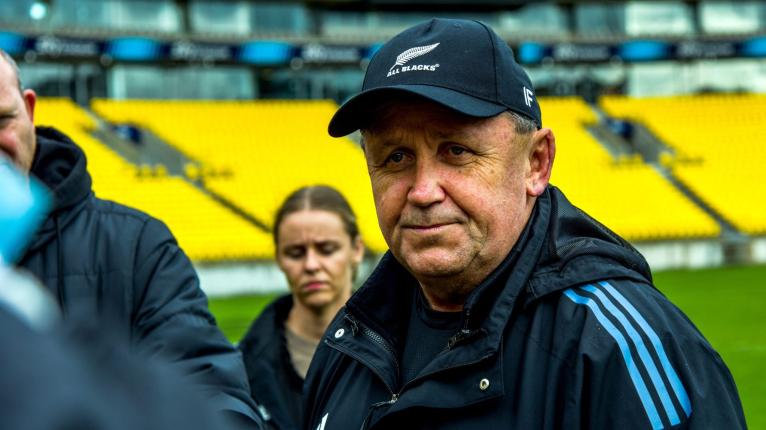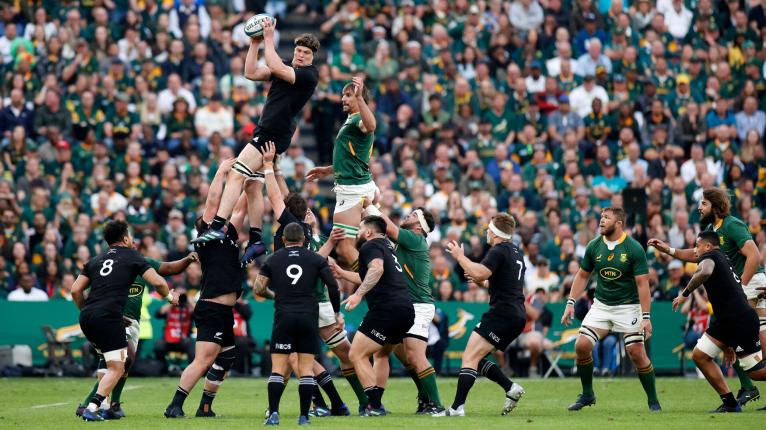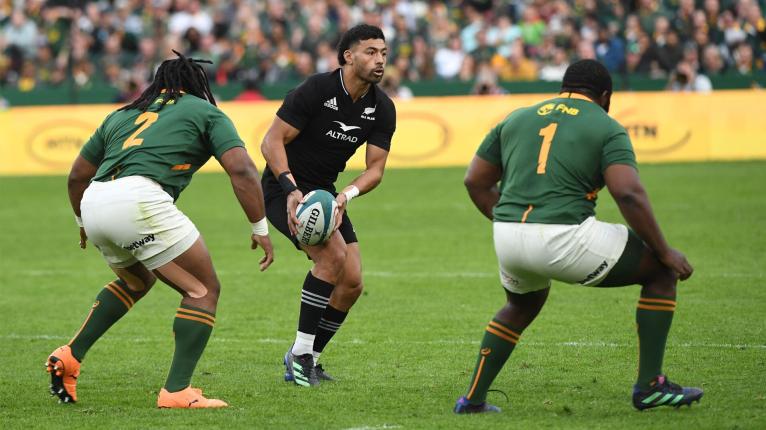An impressive win in Johannesburg might not be enough to save Ian Foster’s career.
New Zealand Rugby CEO Mark Robinson confirmed on Sunday that the governing union’s board will meet this week to determine whether Foster will be kept on as All Blacks head coach after two years of mixed results.
Foster has acquired a smorgasbord of critics over the 32 months since he succeeded Steve Hansen as New Zealand’s top dog. He also entered the role already with many a detractor, based in part on his historic results with the Chiefs, in part on the All Blacks falling at the semi-final stages of the 2019 Rugby World Cup while Foster was an assistant, and in part on the fact that his name is not Scott Robertson.
While Foster spent eight years underneath Hansen, Robertson was honing his craft at Super Rugby level, taking the Crusaders to three successive titles – and a further three since Foster ascended to All Blacks head honcho at the beginning of the 2020 season.
Meanwhile, results under Foster’s charge have been well below what’s expected of an All Blacks team that boasts an historic 77 per cent win-record.

Yes, there have been some good wins, with New Zealand tipping over the likes of Australia, South Africa and Ireland during Foster’s time in charge, but there have also been plenty of losses.
A first-ever defeat at the hands of Argentina in 2020 contributed to the All Blacks recording just a 50 per cent win record for Foster’s inaugural year in the role and things didn’t improve much the following season.
The All Blacks did finish 2021 with 12 wins from 15 games but against top five nations – South Africa, Ireland and France – they managed just one win from four games.
Covid had caused countless issues through the first two years of Foster’s tenure and some of the poor performances – particularly those at the tail-end of last year’s epic campaign – could be at least partially attributed to some of those issues.
“I don’t want to be coming across as if we’re giving excuses for (the poor run of results), but you know this has been a remarkably difficult year in many ways,” Foster said on The Breakdown at the end of last season.
“Having 12-13 weeks on the road in hotels and quarantines, we’ve had two lots of five consecutive test matches in a row and we’ve really run out of steam in the last two… We’ve had two teams that have been waiting for us and it’s probably at the end of our season and they were fresh and had really targeted that game.”
While many New Zealand supporters weren’t happy with how 2021 unfolded, had the All Blacks been able to string together some good performances to kick off the new year it would have likely at least eased some of the pressure on Foster and his assistants.
While the players reportedly gave their full backing to Ian Foster during an end-of-year review, they hadn’t been quite as impressed with his assistants, but no changes were made to the coaching line-up ahead of the new season.
Truth be told, while many New Zealand supporters weren’t happy with how 2021 unfolded, had the All Blacks been able to string together some good performances to kick off the new year it would have likely at least eased some of the pressure on Foster and his assistants – but that never eventuated.
An opening win against Ireland was somewhat of a false dawn, with New Zealand then recording back-to-back defeats in July – handing Ireland their first-ever victory against the All Blacks in NZ as well as their first-ever series win in the country.
Somewhat contradictory to his comments at the end of 2021, Foster then suggested that the All Blacks were traditionally slow starters in July.
Coaching changes were finally made ahead of this month’s trip to South Africa, with John Plumtree and Brad Mooar jettisoned from the line-up in favour of Crusaders forwards coach Jason Ryan and the results at lineout time were immediate.

The All Blacks won 34 of their 42 deliveries throughout July for a satisfactory 81 per cent success rate. Once Ryan took the helm for the two-game series with the Springboks – against perhaps the best lineout disrupters in the business – that figure climbed to 85 per cent. Notably, Samisoni Taukei’aho also took over starting duties from Codie Taylor for the beginning of the Rugby Championship.
It was in dealing with the opposition mauls that the All Blacks really flourished in South Africa, however. They may have conceded a few penalties along the way, but they prevented the Springboks from getting any sort of significant advantage at the lineout drive, effectively shutting down one of the most dangerous parts of their game.
Ryan’s involvement wasn’t enough to secure the All Blacks a result in Mbombela, with the stilted NZ attack easily accounted for by the Springboks defence and the breakdown still a shambles, with the tourists falling to a 26-10 defeat – their worst against South Africa in almost 100 years. It did pay dividends a week later, however, with things clicking into place for the All Blacks in Johannesburg.
The 35-23 triumph at Ellis Park was far and away the best win of Foster’s tenure. Were it up to the head coach, he would undoubtedly be telling the NZR board to judge him on the most recent match but it’s now up to that group to determine whether the win was a sign that things are finally coming right for the All Blacks, or if it was just an anomaly.
With the talent at their disposal, it would be a massive mistake for anyone to completely write the All Blacks off no matter who the opposition. The likes of Ardie Savea, Will Jordan and Rieko Ioane all produced moments of brilliance in South Africa – as they have done throughout their careers – and sometimes the X-factor that NZ has access to can paper over strategic, tactical or coaching cracks.
The fact of the matter is that whatever’s happened in the past, Foster could still be the best man to lead the All Blacks to a World Cup triumph – or at least be capable of doing so and that’s what the New Zealand Rugby board will be assessing: not whether results have been poor (because they absolutely have), but whether the team has now turned a corner.
If the coaches are implementing strategies at training but the game drivers aren’t implementing them on the field, that falls on the players themselves – but it does beg the question of why players aren’t responding to their coaches’ expectations.
Losses to Ireland, France and South Africa aren’t inexcusable but it’s the nature of the defeats that have been so frustrating for viewers, with the All Blacks looking turgid with the ball in hand and uninspired on attack.
The team finally played with some much-needed depth and width at Ellis Park while also front-loading phases with one-off runners hitting the line at pace and lo and behold, momentum was considerably more easily generated than it had been in matches gone by.
Richie Mo’unga said earlier in the week that they’d previously identified the lack of depth was an issue but for one reason or another, had not been able to rectify that in matches.
“It’s tough. There’s a method to their madness with their high line speed pressure,” he said of the Springboks – but really could have been talking about any of the top teams at present.
“Things we talked about to combat that, we didn’t do well at all. A bit of depth, width, variation in your attack; kicking, passing, all these types of things help.
“It is probably just time and space. We are not getting deep enough but they were doing a great job at taking our time and space away.”

As Mo’unga indicated, if the coaches are implementing strategies at training but the game drivers aren’t implementing them on the field, that falls on the players themselves – but it does beg the question of why players aren’t responding to their coaches’ expectations.
On-field strategies aside, the other major concern of Foster’s time in charge so far has been his loyalty to men who simply aren’t performing up to standard.
As mentioned, Samisoni Taukei’aho’s promotion into the No 2 jersey ahead of Codie Taylor paid dividends in a big way against the Springboks but it’s a selection that should have been made at the beginning of the year at the very latest. By the end of 2021, Taukei’aho was already the best-performing hooker in the squad – yet he wasn’t given a start in Europe, nor was he handed one against Ireland this July.
Foster’s commitment to his assistant coaches also hindered the side while young players like Ethan de Groot and Fletcher Newell – men who look like they have plenty of room for growth but are already Test-quality – had to wait for injuries to senior props like Ofa Tuungafasi and Nepo Laulala before they were given a shot.
The selection of Karl Tu’inukuafe in July is another decision that baffles while, until Saturday, David Havili’s continued presence in the midfield rarely paid dividends. Havili was finally able to make an impact against the Springboks at Ellis Park but only after significant strategic changes were implemented and, until those changes, he looked entirely unsuited for the crash-and-bash role in which Foster ostensibly employed him.
Sometimes the harder you try, the worse it can get. That’s such a balancing act when things aren’t going right, not trying too hard and overplaying your hand when you want it so badly.
Sam Cane on success
Perhaps Saturday’s success indicated that the All Blacks have turned a corner.
Speaking the day after the victory in Johannesburg, captain Sam Cane indicated that sometimes you simply need to get the monkey off your back in order to transform from a team that can’t buy a win, to one who can dish up strong performances week after week.
“You can draw some similarities, I suppose,” Cane said when asked whether he had learned anything from a tough run of defeats at the Chiefs over the 2020 and 2021 season. “One being that when we got over our hump, the Chiefs, we actually went on a run, went all the way to the final. It was almost like breaking the shackles a wee bit, just some extra weight that you’re carrying around on your shoulders.
“Sport in general, sometimes the harder you try, the worse it can get. That’s such a balancing act when things aren’t going right, not trying too hard and overplaying your hand when you want it so badly. I didn’t think we did that last night, we had a really good balance, and I think it’s a massive step in the right direction. Last week was too and so to be able to make so many improvements in two weeks is pleasing and the challenge for us will be to continue that improvement and put in a good one back home.”
The difficulty moving forward is that whether the All Blacks change their coaching line-up or not, some good results are inevitable.
After front-loading the year with five tough Tests, NZ will now take on Argentina (twice), Australia (twice), Japan, Scotland and Wales in a run of seven matches they should win and win well. England at Twickenham in late November will undoubtedly prove a big challenge but the upcoming results won’t necessarily indicate whether the All Blacks are continuing to make strides forwards.

With no major obstacles ahead for the foreseeable future, NZR will have to make a call whether Ian Foster can lead the All Blacks onwards and upwards without games that can really test how they’re progressing.
Ian Foster’s senior players have rightly rallied behind the embattled coach.
“I just want everyone to know we got his back, all the players have got his back,” said Ardie Save after getting the better of the Springboks. “He’s a great coach, got great coaches beside him so we back him 100 per cent.”
Sam Cane said he “absolutely” agreed with Savea on Sunday and added: “Myself and the leaders are certainly available for the board or anyone who would like to seek our opinion.
“I think we have got a better insight than most, being in here and knowing footy and working with him day in and day out. We are always available.”
Ian Foster has not lost the dressing room. He ostensibly has the support of all the players in his squad and that will hang heavy over the New Zealand Rugby board if they make the decision to move forward with a different man in charge
It must be a strange time to be an All Black when you’ve regularly indicated that things are going right in camp but the on-field play just doesn’t reflect that and your coach is taking the brunt of the criticism. That doesn’t necessarily mean that Foster has – or is capable of – turning things around, mind you.
It’s amicable that the players have rallied around their coach but it also shouldn’t come as a surprise. After all, Sam Whitelock is the only player in the squad to have ever experienced life as an All Black without Ian Foster being involved in some capacity.
But, the fact remains that Ian Foster has not lost the dressing room. He ostensibly has the support of all the players in his squad (although you do suspect that some of the men who have had fewer opportunities to showcase their skills might not be quite so passionate) and that will hang heavy over the New Zealand Rugby board if they make the decision to move forward with a different man in charge.
Perhaps the decision was already made before the All Blacks even set foot on a plane to South Africa, perhaps it was made after they barely fired a shot in Mbombela, perhaps the eight members of the board had independently made up their minds before this week’s discussions.
Deciding whether to stick with Ian Foster or switch things up isn’t as simple as looking at past results, however. If there was enough on display at Ellis Park to suggest the All Blacks have turned a corner then the historic defeats can – and should – be forgotten. Unfortunately for Foster, it might just be too little too late.



Comments
Join free and tell us what you really think!
Sign up for free